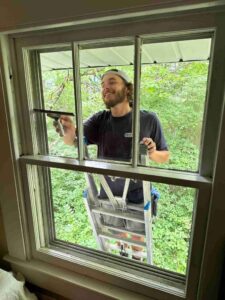A Complete Guide: How to Insulate Windows
DIY Solutions, Professional Installations & More
Are you struggling to keep cold air in during warm months, or cold air out during cold months? It’s not a fun position to be in, and finding the source of the air flow can be frustrating—and even worse, once you find it, you might not know how to fix it. If you’ve ever put a towel or blanket against a doorway or window sill, we feel your pain.
The good news is that it doesn’t have to keep happening. Overall, window cleaning and proper insulation is essential in preventing unwanted air from flowing in or out of your home. For example, keeping your windows clean all year can prevent dirt, grime, and mildew from damaging sills, trim, and glass which could lead to potential insulation issues. Next, knowing how to insulate the windows yourself or with the help of a professional will be great for the long term—no more towels rolled up around the drafty windows. Taking these measures may even save you money on your energy bill. Before we dive into window insulation, let’s review the benefits, and how to identify affected windows. You’ll be one step closer to throwing in the towel for good (and we mean that in the best way possible).
Benefits of Insulating Your Windows
There are certainly year-round benefits to insulating glass windows, like keeping your home a comfortable temperature without any drafts, and saving money on your heating and cooling bill. Other perks of insulated windows that you can enjoy all year include:
- Noise Reduction
- Heightened Security
- Increased Property Value
- Strengthened Windows
- Simple Maintenance
However, if you’re considering learning how to insulate windows to combat a particularly uncomfortable summer or winter season, that’s fair too. In the summer, well-insulated windows will help keep cool AC air inside, and in the winter, they will keep the cold air out—simple concept, but you’d be surprised how many people don’t think to invest in this for their home.
Identify the Affected Windows
First and foremost, the easiest, most non-invasive way to check for poorly insulated windows is to search for cracks, gaps, or wear and tear around window framing. You may also look for dry rot and wood damage—check out our blog to learn more about detecting and preventing dry rot if you’re suspicious about an area.
Next, if the signs aren’t obvious, try testing for poorly insulated windows by looking at the edges of the window frame inside the house on a sunny day. If you can see small specks of sunlight through the seam where the frame meets the wall, that means there are small gaps that need to be insulated. On the other hand, you can also test for poorly insulated windows on a rainy day by running your hand along the seam between the frame and wall. If you feel moisture or dampness, there are likely small cracks in the window frame that are letting water in—those are clear signals that your windows need additional insulation.
The Fix: How to Insulate Windows
Now that you’ve found the source of the problem, it’s time to learn how to insulate windows properly. Depending on the extent of the issue or how many windows the home has, you may need to hire a professional to help—but going DIY-style is perfectly fine if you’re comfortable.
If you decide to do it yourself, here are 5 simple ways you can do it in a home or apartment:
- Use window insulation film or an insulation kit
- Cover windows with bubble wrap
- Install removable magnetic window insulation
- Use rope caulk to seal cracks
- Add thermal curtains to windows
Head over to Move’s article for an in-depth look at how to do each of the five tactics listed, and if you’re particularly interested in some great insulated curtain and blind options, check out Tiny House, Huge Idea’s list of suggestions. And because we’re still old-school, we’ll throw in a sixth DIY way to insulate your windows—and it’s an easy one. Swap the old dirty towel for a durable draft stopper—we recommend only resorting to this option if your problem isn’t very serious.
Investing in Insulated Glass Units (IGU)
Knowing how to insulate windows can’t stop at simple measures, especially if a lot of your windows are showing signs of cracks and damage, or if the problem isn’t going to be fixed by a quick caulk job. In fact, it may be time to consider investing in insulated glass units or IGUs.
IGUs are either double- or triple-pane windows with panes of glass that range in thickness, and are separated by a spacer and sealed to prevent condensation buildup. Interestingly, they were invented in 1865 and became more popular in homes and commercial buildings starting in the 1930s. Having said that, your home may already have IGU windows—simply view your reflection in the glass to check. If you see a single reflection, that means you don’t have IGUs (and you should get them), but if you see a double or triple reflection, you already have them.
So, what do you do if you have IGUs and are still experiencing insulation problems? Well, your IGUs may not have enough spacing between panes. Glass itself is not a good insulator, but the air pockets, which are often filled with gas, are because they prevent heat transfer. If your spacing is minimal, it may be a good time to think about installing new IGUs that pack a bigger punch.
On the other hand, as we have already touched on, if you don’t have IGUs in your home, we highly recommend considering them. Sure, it may be a hefty up-front investment, but it will certainly pay off in the long run and increase your home’s property value.
Our Top Insulated Window Recommendations
If DIY is out of the question and you’re thinking about replacing your current windows, review our list of top model recommendations for a good jumping off point:
- JELD-WEN® Windows
- Milgard® Windows Energy Packages
- Andersen® Windows with the EcoExcel™
- Pella Energy Efficiency
Many of these energy efficient windows are also a part of the Energy Star program and will come with a sticker that displays their rating from the National Fenestration Rating Council (NFRC). To qualify for this rating, windows have to meet specific standards related to resistance to heat loss and how much heat can enter through the glass.
Preventing Insulation Issues
In general, a good rule of thumb to prevent damages that could cause insulation issues to your windows is to get your windows professionally cleaned on a regular, annual basis. Specifically, we recommend twice a year—once in the late spring after pollen season has passed, and once in the fall after the summer rain is mostly gone. The more you care for your windows year round, removing dirt, grime, and mildew, the less likely you are to develop cracks, dry rot, and damaged glass pores. These are all big hitters when it comes to increasing your risk for insulation problems.
Aside from the obvious aesthetic unpleasantries and festering cracks, dirty windows can also pose various health risks to you and your family. Condensation buildup can increase the chance of bacteria, dust, and mildew growth which can cause air pollution, respiratory problems, and even dust mites.
If you didn’t know how to insulate your windows before, hopefully you do now. Whether that means taking the bull by the horns and doing some DIY fixes, or getting professionals to install new insulated glass units, it’s always a good idea to add value to your home and get the help you need. Check out our blog for more window care tips and snag our DIY window cleaner solution recipe, or find out what questions you should be asking a residential window washing company before hiring them for the job. Ready to tackle other home improvement projects to increase your property value and peace of mind? Learn more about our gutter guard services as well—they may be a great fit for you.


